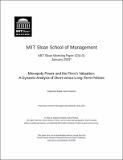Monopoly Power and the Firm’s Valuation:
Author(s)
Basak, Suleyman; Pavlova, Anna
Download4234-01.pdf (309.2Kb)
Metadata
Show full item recordAbstract
Recent anti-trust cases exacerbated the concerns of investors regarding the effects of a firm's monopoly power on
its production choice, shareholder value, and the overall economy. We address this issue within a dynamic
equilibrium model featuring a large monopolistic firm whose actions not only affect the price of its output, but also
effectively influence the valuation of its stock. The latter renders time inconsistency to the firm's dynamic production
choice. When the firm is required to pre-commit to its strategy, the ensuing equilibrium is largely in line with the
predictions of the textbook monopoly model. When the firm behaves in a time-consistent manner, however, the
predictions are strikingly at odds. The trade-off between current profits and the valuation of future profits induces
the firm to increase production beyond the competitive benchmark and cut prices. This policy may result in
destroying shareholder value, and does indeed fully wipe out the firm's profit in the limit of the decision-making
interval shrinking to zero, in line with the Coase conjecture.
Date issued
2004-07-09Series/Report no.
MIT Sloan School of Management Working Paper;4234-01
Keywords
Monopoly, Asset Pricing Theory, General Equilibrium, Short-Sighted, Time-Consistency, Coase